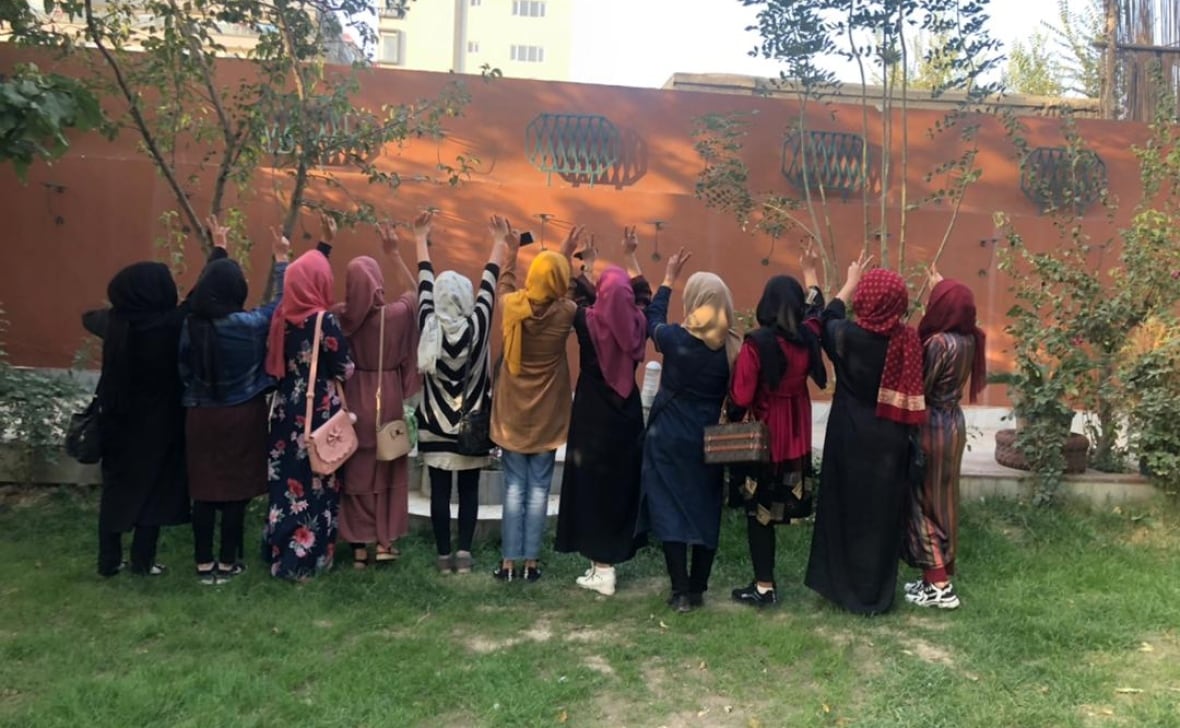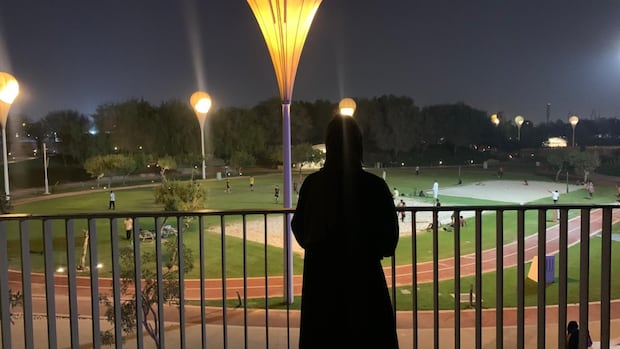Nilab still remembers the day Kabul fell to the Taliban in 2021. She was at the bank trying to pay for her sister’s passport in preparation for fleeing the country.
Dressed in a red suit from work and with her hair uncovered, every taxi driver refused to take her home. Nilab, 29, says they feared they would be killed by the Taliban for giving her a ride without a male guardian.
At the time, she had a professional job and was studying at the American University of Afghanistan. Her father worked for the U.S. government. The family had to flee. She says getting out was dangerous enough, and returning is not an option.
“There is no way back to Afghanistan,” Nilab said by video call from her dorm room in Qatar, where she has studied computer science for the past three years. CBC News has agreed to conceal her identity because of safety concerns.
If she and her sister return to Afghanistan, they would likely be caught as soon as they land at the airport, she said.
“They would torture us. They would kill us.”
Both women are currently facing deportation from Qatar after the scuttling of the USAID program upended their studies at the American University of Afghanistan’s so-called “campus in exile” in Doha.
The women’s scholarships to the Middle East were completely “dependent and reliant on the USAID funding,” said Friba Rezayee, the executive director of Women Leaders of Tomorrow, a Vancouver-based non-profit which works to pair Afghan women with scholarships in the United States and Canada.
When USAID was defunded, the women “were basically left to cry.”
Without a valid study or work permit, Nilab must leave Qatar in September, when her current Qatar residence permit expires. Up to 25 women in the same situation are hoping to find safety at the University of Regina in Saskatchewan.
The university and Women Leaders of Tomorrow are working to raise half a million dollars to cover the international tuition fees of the women and bring them to Canada.
Currently, they’ve raised around $170,000, said Rezayee.
“They were left without hope, certainty or any light in their lives,” Rezayee said.
The students reached out to her, and Rezayee put out a call to Canadian post-secondary schools asking for help. The University of Regina was one of the very first universities to step up and help, Rezayee said.
“They’re willing to put up the work. They’re willing to do all the paperwork.”
U of R says it has room for all the students put forth
University of Regina President Jeff Keshen says the school is doing everything it can to provide support for the students and to raise funds.
The university launched its Project Resilience scholarship program back in 2022, to provide students fleeing war, conflict or political violence in their home countries with funding to study at the University of Regina.
“We will provide them with free housing and a meal plan, as long as they will pay the international tuition,” Keshen said, adding that the school has the “luxury” of space on campus.
“We’re one of the places in Canada that actually has capacity to accept students on our campus, in rooms,” Keshen said, “We don’t have a housing crisis at U of R.”
The $500,000 fundraising goal would cover all the students put forth by Women Leaders of Tomorrow. Currently, Keshen said there’s enough money to bring “a portion of those students” over, pending approval from the federal government for their study permits.
“If we can’t do it all, we’ll do what we can,” Keshen said.
All the prospective students are “very talented,” as many have attended professional schools and are partway through their masters’ degrees, Keshen said.
“We’re hoping that we can help these very deserving students have a new opportunity at the University of Regina, rather than returning to what’s going to be horrible circumstances,” Keshen said.

He said the university has found that Immigration, Refugees and Citizenship Canada (IRCC) has been operating at a “glacial pace” for processing international students.
“Sadly the refusal rate is very high or these applications just don’t get processed. They sit and they wait and then the student by default doesn’t get over here,” Keshen said.
“Really this is a federal issue at this point,” he said. “The ball is in Ottawa’s court now.”
In a statement to CBC, IRCC acknowledged that some students, including those with acceptance letters to Canadian schools, “may have been experiencing increased processing times for their study permit applications.”
“While an offer of admission is an important step, it does not automatically lead to a study permit,” the statement said.
“Decisions are made by highly-trained officers who carefully and systematically assess each application against the criteria set out in the Immigration and Refugee Protection Act (IRPA) and its regulations,” said the statement.
Rezayee said even if all 25 women can come to Saskatchewan, there will still be more left behind in Qatar.
“We’re trying to help as many as we can,” she said.
Women Leaders of Tomorrow is currently looking for volunteers in Regina to help the women settle into their new communities — things like giving the women a tour of the city and helping them find a doctor.
She said the group wants to start the admission letter process, though the final number for how many can come is still being determined.
A life interrupted
Nilab said she has been in contact with the University of Regina about what she’ll study, but her younger sister is still waiting for news. The two are separated from the rest of their family, who were able to immigrate to the United States before President Donald Trump restricted the entry of Afghan nationals to the United States.
Nilab had already mailed all belongings from Qatar to the United States when the policy change was made.
“My clothes are in the U.S. and I’m still here,” she said, joking that if she makes it to Canada, it will be “easier” to get them back.
But being separated from her family is painful, she said. “It is like part of your body is here, another part of your body is with them.”
She said she will only go to Canada if her sister is able to as well, no matter how much she wants to finish her education.
“I registered for my bachelors in 2018. Then a lot happened,” said Nilab. If the Taliban hadn’t upended the trajectory of her life, she would have graduated and had a PhD by now, she said.
“But I’m still stuck,” Nilab said.
She wants to complete a masters degree in AI and her sister is planning to get a masters degree in cybersecurity.
Nilab says she is sad she was unable to study in the U.S., “But another hope is that [the university of] Regina will help us to get our masters not in America, but in Canada.”







